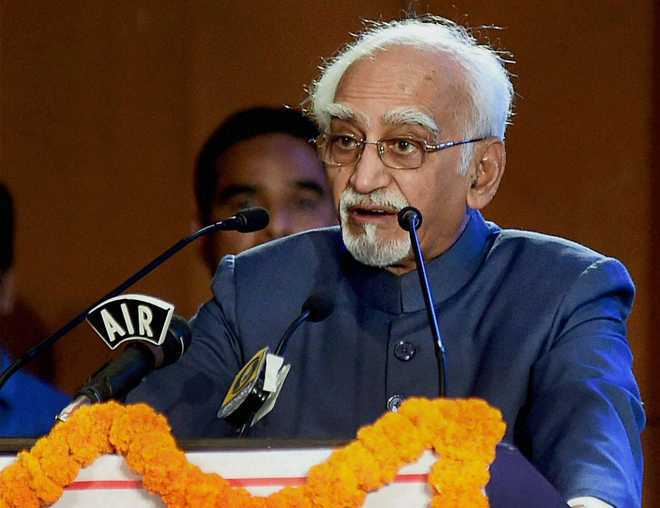Tribune News Service
New Delhi, March 9
Former Vice President Hamid Ansari on Saturday said if the media has a specific orientation, it must say so candidly.
Delivering the BG Verghese Memorial lecture, he said for the media to play its designated role, it must be impartial and unprejudiced in coverage of news and views connected with all segments of society.
“The media must not be subservient to vested interests or be distorted by these trends. However, he regretted that despite the media’s impressive numbers and diversity, phenomena like cross-media ownership, paid news and fake news, as also the declining role of editors and their editorial freedom, do raise questions about its objectivity and credibility,” Ansari said at a function helmed by the India Foundation which awarded the Chameli Devi Award for outstanding journalism for 2018 to BBC’s Priyanka Dube for her work on mob lynching, UP encounters and encephalitis deaths in Gorakhpur.
Strident nationalism, on the other hand, he said, has no hesitation in transcending and transgressing individual rights guaranteed by the Constitution. “It therefore has to be guarded against and its ideological premises contested.”
Violence against journalists remains a matter of serious concern, he said. Ansari dwelt on two aspects: firstly, violence by those in segments of militant public who do not want coverage of misdeeds, the Gauri Lankesh case being the most condemnable instance of it; and secondly by the authorities in the shape of local security forces who do not want the media to report strong-arm tactics used against public expressions of outrage in specific happenings. Correctives to the latter are few and rarely prompt, as in the Hashimpura killings case of 1986.”
“In most of these, there is usually state complicity in acts of omission or commission. Both transgress what the law permits; both violate the Rule of Law,” he observed while referring to the prevailing crisis of credibility, internal constrains, curtailment of dissent and an atmosphere of intimidation in the media highlighted by specific instances of violence.
The phenomenon of fake news, ‘alternate facts’, and trolling has added to it in good measure, he said while referring to a former Chief Election Commissioner who felt these tendencies had impacted voter behaviour in the previous general elections. There was need for a robust mechanism for conduct of social media platforms, he suggested.
Unlock Exclusive Insights with The Tribune Premium
Take your experience further with Premium access.
Thought-provoking Opinions, Expert Analysis, In-depth Insights and other Member Only Benefits
Already a Member? Sign In Now











